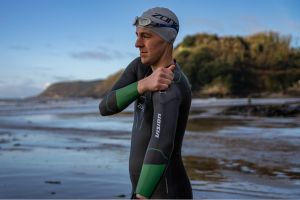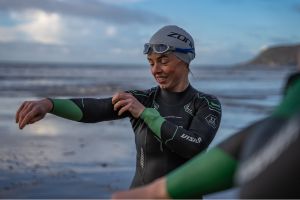It’s common knowledge that to train well and to perform well, an athlete first needs to eat well.
A good, well-balanced and nutritious diet is the triathlete’s best way to make sure they’re performing to the standard they want to be. A happy body leads to a happy mind, personal bests and record-breaking triathlon times, but there are extra supplements that athletes can take to make sure they’re getting all the vitamins and nutrients they need! They’re becoming more and more readily available, it’s the perfect time to consider whether the below supplements may be beneficial to you:
Creatine:
A supplement that first became popular in the 90’s, Creatine Monohydrate (CM) is a supplement that increases naturally produced creatine-phosphate in the body’s muscle stores, which in turn then aids high energy output. CM is particularly useful for sprinting and weight training and is ideal for strength and power athletes. Creatine Phosphate is what is used by the body whenever its experiencing maximum-intensity exercise, so CM is perfect for when the body is enduring intense exercise.
This isn’t a quick fix supplement and is one to be taken by those who wish to work hard to achieve their goals. It’s worth noting that CM can also improve lactate tolerance during harder bouts of exercise. This supplement is best for vegetarians or those who’re on a low red meat diet and is designed to be used for a shorter period of time. Not just useful for weight training, runners can benefit from CM too, as it has been proven to increase performance in interval workouts, which is an important part of a runner’s training.
If you choose to incorporate creatine supplements into your diet, try products that contain Creapure as its primary ingredient. This is creatine in its highest form and is often available in powder form, without the chalkiness, making it easier to consume.
If travelling, consider creatine in capsule form. It’s a lot easier to take with you than the powder form, especially if travelling internationally.
Creatine is present in very little foods but is mostly in red meat, pork, poultry and fish. You will find very little levels of creatine in dairy, eggs and shellfish, although it is present in them. Creatine is also reduced during cooking, so be aware that the more ‘well done’ your meat is, the less creatine will be present.
Creatine is primarily found in muscle meats, including liver, heart and kidney. If you’re a vegetarian/vegan, then creatine may not be for you. Always check package ingredients to double check.
The recommended dosage of creatine is 5g per day, with 20-30g carbohydrate for around 1 month.
Omega 3 (Fish Oil):
In short, Omega-3s are perfect for heart health, muscle reparation and pain reduction. The main Omega’s found in fish oil are EPA (eicosapentaenoic acid) and DHA (docosahexaenoic acid) which are great for the heart, as Omega-3s work to lower chronic inflammation which can lead to heart disease. Everyone knows that a strong healthy heart can keep you running for longer, both in the races and in general. Omega-3 is also great for repairing those tiny little muscle tears you’ll find yourself getting during intensive exercise. Not only does it repair the muscles, but it helps to strengthen them which then, in turn, makes them less likely to tear again, which can lead to bigger injuries. Coupled with rest, Omega-3s are perfect for those days off in-between training sessions.
What’s also amazing about Omega-3? It helps prevent soreness often felt after exercise. Muscle soreness is the body’s inflammatory response to muscle tears, and Omega-3 has natural anti-inflammatory effects, which essentially reduces the signals made to the brain to induce muscle pain, therefore reducing inflammation and overall pain after working out.
So, if you’re looking to reduce muscle pain after intense workouts, seek out Omega-3, which is found primarily in cold water fish. Omega-3 also helps increase fat oxidation during endurance training, whilst also decreasing carbohydrate oxidation. Essentially this means that Omega-3 helps you burn more fat whilst you’re engaging in steady exercise, without starving the body of the carbohydrates it needs to fuel the workout.
The recommended amount of Omega-3 per day is 250-1,000mg for most people. To achieve this aim for two servings of fish rich in Omega-3 (tuna, mackerel, salmon etc) a week or take fish oil supplements available in tablet form. In addition to the EPA and DHA found in these sources, plant-based sources of Omega-3s include flax seeds, chia seeds and walnuts.

Iron:
Iron helps the body’s red blood cells to carry oxygen from the lungs to other cells all over the body. Per day, the recommended iron intake for men is 10 grams per day, and for women, it’s 15 grams. Women naturally need more iron than men but sometimes find it difficult to get enough iron through diet alone. Iron is essential for the process of the formation of red blood cells and an iron deficiency can lead to the common issue of anaemia, which is characterised by persistent and unavoidable fatigue – which is definitely something an athlete would want to avoid.
Anaemia is quite a common problem and is considerably more common amongst endurance athletes (especially runners) than in the general population. This is mostly due to iron loss through sweating and other exercise-related activities. Below are some great food sources of iron:
- Lean beef
- Oysters
- Chicken
- Turkey
- Beans & Lentils
- Tofu
- Baked Potatoes
- Cashews
- Dark green, leafy vegetables (spinach etc)
- Fortified breakfast cereals
- Whole-grain and enriched bread
Iron deficiency is quite avoidable, through adequate iron intake in your general diet. The above foods are naturally high in iron, although iron tablets are readily available and often recommended by health professionals, due to how difficult it is to accurately source enough iron in your diet. Iron supplements should only be taken under a doctor’s supervision and your iron levels can easily be detected through a simple blood test. High iron levels in the body are toxic and can lead to severe health problems, so always check with a doctor before taking iron supplements. Iron supplements are not recommended for children.

Multivitamins/Multimineral Supplements:
These are quite often regarded as being useful to ensure that any dietary gaps in nutrition are covered. Although a lot of people manage to eat a very balanced and well-maintained diet, some people can find that taking multivitamins can be a way to ensure they’re receiving all the vitamins their body needs. If you’re someone who has a militant, well-balanced diet and you know you’re receiving all your recommended vitamins – don’t take these supplements. Taking these can lead to ‘megadosing’ which is simply where the body is given too much of what it needs. You should also always avoid taking multivitamins as a substitute for a good diet.
The best multivitamins to look for, are called “real food” supplements. These are supplements that contain extracts from real food and vitamins and minerals in the forms found in real foods, instead of individually rawer forms of vitamins, which the body will treat as a foreign chemical. It’s best to take multivitamins with a meal, as this helps aid absorption.
Vitamin D:
Vitamin D deficiency is a leading issue throughout the whole general population. Vitamin D is fat-soluble and is naturally present in very, very few foods, hence why it’s readily available in tablet form and even injection form. Vitamin D is also produced when UV rays from sunlight hit human skin and trigger Vitamin D synthesis. Vitamin D can be presented to the body, but it must go through several processes in the liver before it can take effect. Vitamin D is helpful for promoting calcium absorption in the gut and helps maintain calcium and phosphate concentrations (good for the bones) and prevents diseases such as rickets and osteoporosis. Vitamin D also helps the immune system, cell growth and reduction of inflammation, which is great for exercise.
The main source of Vitamin D is sunlight, but we all know that it can be increasingly difficult to rely on sunshine. People who spend a lot of time outdoors (particularly athletes) have been found to have higher levels of Vitamin D in their bodies, and its recommended that we all try and get outside and experience direct sun exposure for up to 10-15 minutes a week, to try and promote natural Vitamin D production within us. Because so many people experience low Vitamin D levels, supplements are available to make it just that little bit easier, especially in the winter months.
Although Vitamin D can be available in tablet form, try eating the below foods to help top up your Vitamin D levels:
- Fatty fish, like tuna, mackerel and salmon
- Foods fortified with Vitamin D – orange juice, soy milk, cereals etc
- Beef Liver
- Cheese
- Egg yolks
Caffeine:
Caffeine is not a chemical which is naturally present in our bodies, but it can aid us massively. In modest doses, caffeine can significantly improve performance and endurance during exercise. Caffeine is commonly used to help combat fatigue, make us more alert and concentrate harder. The stimulant effect we feel whenever we have caffeine comes mostly from the way it reacts with our adenosine receptors in our nervous system. Adenosine is present in our central nervous system and binds to receptors to slow down our brain activity, which is what makes us feel sleepy. Adenosine’s role is to help aid good oxygenation during sleep, but can sometimes occur when we don’t want it to. Caffeine binds to the receptors that adenosine wants to, and thus prevents it from slowing us down. It speeds up brain activity, which is what makes us feel more alert and ‘ready to go’. Caffeine also causes our pituitary glands to release hormones, which in turn then make us produce more adrenaline. As you probably know, adrenaline is the ‘fight or flight’ hormone which increases our attention levels and really helps aid our energy levels.
The main source of caffeine is usually in coffee or energy drinks. A lot of triathlete’s drink energy drinks at aid stations whilst on the running leg of an event. This can help give them a short burst of energy to get them through to the finish line.
As always, the most important thing to remember is that these supplements should be incorporated into your everyday diet and should be introduced gradually. There’s no benefit in just taking these supplements in bulk on race day. And remember everything in moderation. Always speak to a medical professional before attempting anything new and don’t go against medical advice. Our bodies all react differently to different things and it’s important to remember that supplements should never be taken as a meal replacement. A well-balanced diet is the best way forward. Supplements are designed to go alongside a good diet and well thought out exercise plans.

Written by Catharyne Walton-Matthews





















